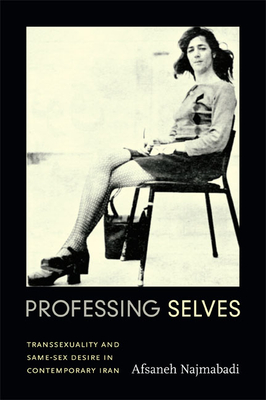Professing Selves: Transsexuality and Same-Sex Desire in Contemporary Iran

Professing Selves: Transsexuality and Same-Sex Desire in Contemporary Iran
Since the mid-1980s, the Islamic Republic of Iran has permitted, and partially subsidized, sex reassignment surgery. In Professing Selves, Afsaneh Najmabadi explores the meaning of transsexuality in contemporary Iran. Combining historical and ethnographic research, she describes how, in the postrevolutionary era, the domains of law, psychology and psychiatry, Islamic jurisprudence, and biomedicine became invested in distinguishing between the acceptable "true" transsexual and other categories of identification, notably the "true" homosexual, an unacceptable category of existence in Iran. Najmabadi argues that this collaboration among medical authorities, specialized clerics, and state officials--which made transsexuality a legally tolerated, if not exactly celebrated, category of being--grew out of Iran's particular experience of Islamicized modernity. Paradoxically, state regulation has produced new spaces for non-normative living in Iran, since determining who is genuinely "trans" depends largely on the stories that people choose to tell, on the selves that they profess.
PRP: 313.64 Lei
Acesta este Prețul Recomandat de Producător. Prețul de vânzare al produsului este afișat mai jos.
282.28Lei
282.28Lei
313.64 LeiLivrare in 2-4 saptamani
Descrierea produsului
Since the mid-1980s, the Islamic Republic of Iran has permitted, and partially subsidized, sex reassignment surgery. In Professing Selves, Afsaneh Najmabadi explores the meaning of transsexuality in contemporary Iran. Combining historical and ethnographic research, she describes how, in the postrevolutionary era, the domains of law, psychology and psychiatry, Islamic jurisprudence, and biomedicine became invested in distinguishing between the acceptable "true" transsexual and other categories of identification, notably the "true" homosexual, an unacceptable category of existence in Iran. Najmabadi argues that this collaboration among medical authorities, specialized clerics, and state officials--which made transsexuality a legally tolerated, if not exactly celebrated, category of being--grew out of Iran's particular experience of Islamicized modernity. Paradoxically, state regulation has produced new spaces for non-normative living in Iran, since determining who is genuinely "trans" depends largely on the stories that people choose to tell, on the selves that they profess.
Detaliile produsului











